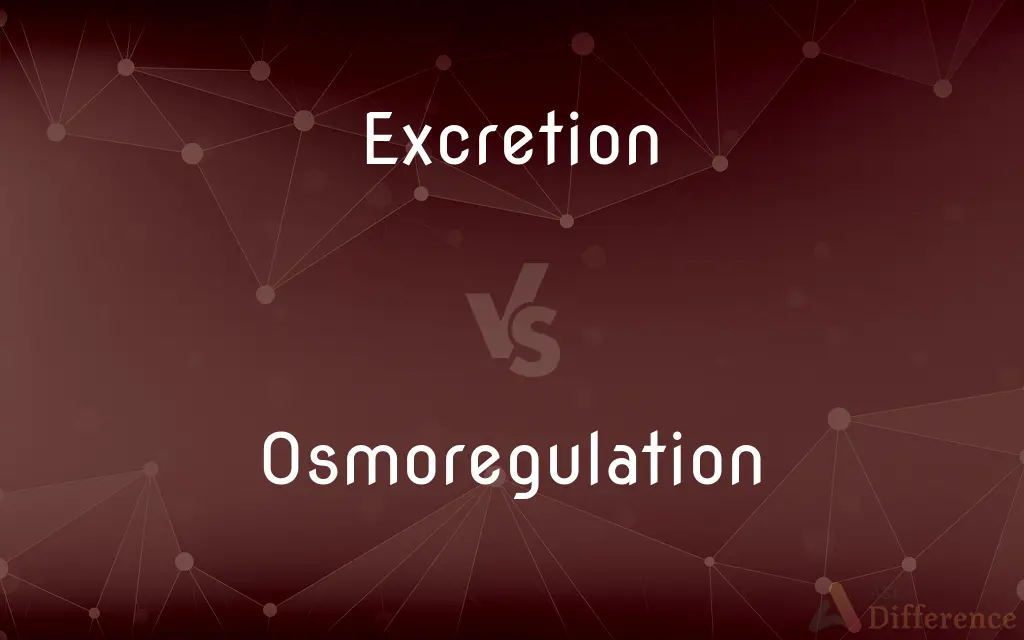Excretion vs. Osmoregulation — What's the Difference?
By Tayyaba Rehman — Updated on October 30, 2023
Excretion is the removal of metabolic waste, while osmoregulation is the balance of water and solutes in an organism.

Difference Between Excretion and Osmoregulation
Table of Contents
ADVERTISEMENT
Key Differences
Excretion is the biological process of removing metabolic waste products and toxins from the body. These wastes include substances like urea, carbon dioxide, and excess salts. Osmoregulation, on the other hand, is concerned with maintaining the balance of water and solutes within an organism, ensuring proper hydration and ionic balance.
The process of excretion involves organs like kidneys, lungs, and skin. It's crucial for preventing the accumulation of harmful substances. Osmoregulation, however, primarily involves kidneys in vertebrates and various specialized structures in other organisms, focusing on regulating the concentration of bodily fluids.
While excretion is essential for detoxifying the body, osmoregulation is vital for preventing dehydration or overhydration, which can disrupt cellular processes. Osmoregulation also plays a key role in maintaining blood pressure and volume.
Excretion is a process shared by all living organisms, from simple bacteria to complex mammals. Osmoregulation, while also universal, can vary significantly in its mechanism depending on an organism's habitat, whether it's aquatic or terrestrial.
Understanding excretion helps in studying the body's metabolic processes and health, while knowledge of osmoregulation is critical in understanding how organisms adapt to different environmental conditions, especially in terms of water availability.
ADVERTISEMENT
Comparison Chart
Main Function
Removal of metabolic waste and toxins.
Maintenance of water and solute balance in the body.
Primary Organs Involved
Kidneys, lungs, skin.
Kidneys, gills, specialized cells.
Biological Purpose
Detoxification and preventing waste accumulation.
Preventing dehydration or overhydration, ionic balance.
Importance
Essential for metabolic health and removing toxins.
Vital for cellular processes and fluid balance.
Variation Across Organisms
Common in all organisms but differs in complexity.
Varies widely, especially between aquatic and terrestrial organisms.
Compare with Definitions
Excretion
Biological process of eliminating metabolic waste.
Kidneys play a crucial role in the excretion of urea.
Osmoregulation
Regulation of water and solute concentrations in organisms.
Fish use osmoregulation to maintain salt balance in seawater.
Excretion
Removal of substances that are harmful or unnecessary.
Sweating is a form of excretion that helps regulate body temperature.
Osmoregulation
Process of maintaining fluid balance in biological systems.
Humans rely on osmoregulation to regulate blood pressure.
Excretion
Act of discharging waste from the body.
Excretion of carbon dioxide occurs through respiration.
Osmoregulation
Biological mechanism to control internal water content.
Desert animals have specialized osmoregulation to conserve water.
Excretion
Elimination of chemical compounds to maintain homeostasis.
The liver is involved in the excretion of various toxins.
Osmoregulation
Homeostatic control of water and electrolytes in the body.
Kidneys are central to osmoregulation in mammals.
Excretion
Process of getting rid of by-products of metabolism.
Plants engage in excretion by releasing oxygen as a by-product of photosynthesis.
Osmoregulation
Adaptation for managing solute concentrations in cells.
Plants use osmoregulation to cope with saline soils.
Excretion
Excretion is a process in which metabolic waste is eliminated from an organism. In vertebrates this is primarily carried out by the lungs, kidneys, and skin.
Osmoregulation
Osmoregulation is the active regulation of the osmotic pressure of an organism's body fluids, detected by osmoreceptors, to maintain the homeostasis of the organism's water content; that is, it maintains the fluid balance and the concentration of electrolytes (salts in solution which in this case is represented by body fluid) to keep the body fluids from becoming too diluted or concentrated. Osmotic pressure is a measure of the tendency of water to move into one solution from another by osmosis.
Excretion
(in living organisms and cells) the process of eliminating or expelling waste matter.
Osmoregulation
Maintenance of an optimal, constant osmotic pressure in the body of a living organism.
Excretion
The act or process of discharging waste matter from the blood, tissues, or organs.
Osmoregulation
The homeostatic regulation of osmotic pressure in the body in order to maintain a certain water content (concentration of electrolytes, pH, etc).
Excretion
The matter, such as urine or sweat, that is so excreted.
Excretion
The process of removing or ejecting material that has no further utility, especially from the body; the act of excreting.
Excretion
Something excreted in that manner, especially urine or feces.
Excretion
The act of excreting.
To promote secretion and excretion.
Excretion
That which is excreted; excrement.
Excretion
The bodily process of discharging waste matter
Excretion
Waste matter (as urine or sweat but especially feces) discharged from the body
Common Curiosities
Is osmoregulation solely a kidney function in humans?
Kidneys play a primary role, but other organs and systems also contribute to osmoregulation.
Is excretion an involuntary process?
Yes, excretion is generally an involuntary and automatic biological process.
Is excretion the same as defecation?
No, excretion specifically refers to removing metabolic waste, while defecation is the expulsion of undigested food.
Can osmoregulation affect blood pressure?
Yes, osmoregulation can influence blood pressure by controlling blood volume and solute concentration.
Do all animals osmoregulate in the same way?
No, osmoregulatory mechanisms vary widely among different species.
Do plants engage in excretion?
Yes, plants excrete oxygen and other metabolic by-products.
Does excretion contribute to detoxification?
Yes, excretion helps remove toxins from the body, aiding detoxification.
Are sweat and urine part of excretion?
Yes, both are involved in excreting different types of waste from the body.
Can excretion occur through respiration?
Yes, carbon dioxide is excreted through respiration.
Are hormones involved in excretion?
Yes, hormones like ADH (antidiuretic hormone) play a role in regulating excretion.
Can osmoregulation be disrupted by illness?
Yes, diseases like kidney disorders can disrupt osmoregulation.
Can excretion rates vary with diet?
Yes, different diets can affect the rate and type of substances excreted.
How does osmoregulation differ in freshwater and saltwater fish?
Freshwater fish constantly gain water and lose salts, while saltwater fish lose water and gain salts, requiring different osmoregulatory strategies.
Is osmoregulation affected by dehydration?
Yes, dehydration triggers osmoregulatory mechanisms to conserve water.
Are desert animals adapted for efficient osmoregulation?
Yes, desert animals often have adaptations for minimizing water loss.
Share Your Discovery

Previous Comparison
Nippy vs. Cold
Next Comparison
Citronellol vs. CitralAuthor Spotlight
Written by
Tayyaba RehmanTayyaba Rehman is a distinguished writer, currently serving as a primary contributor to askdifference.com. As a researcher in semantics and etymology, Tayyaba's passion for the complexity of languages and their distinctions has found a perfect home on the platform. Tayyaba delves into the intricacies of language, distinguishing between commonly confused words and phrases, thereby providing clarity for readers worldwide.















































